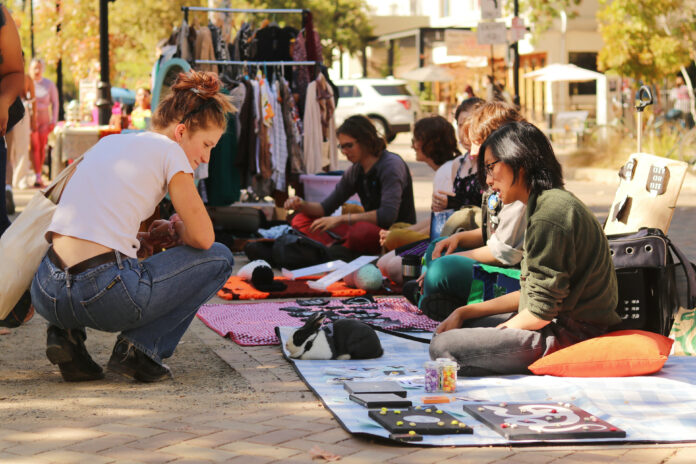Students share how selling their art at the Davis Art Market gives them a creative outlet
By MARIA MARTINEZ CASTRO — features@theaggie.org
The Davis Art Market serves as a hub for art creators, small-business owners and vendors to share and sell their things to the Davis community. Along 3rd Street, one can find an array of products lining the sidewalk — including crochet hats, unique fashion pieces, handmade jewelry and customized acrylic nail sets.
While many UC Davis students use the space to promote their business and art, other artists from the surrounding region have also set up shop within the art market. The market has even grown to attract and welcome vendors outside of Davis.
While the art market does not exclusively house UC Davis student entrepreneurs’ shops, it has served as a platform for many students to establish and grow their small businesses.
Pinny Kantacheerawat, a fourth-year mechanical and aerospace engineering major, and Lauren Tsujioka, a fourth-year political science major, are business partners running Cowtown Nails. Their business focuses on creating fun, customized acrylic press-on nails.
“For me, I feel like nails are just like my artist side,” Kantacheerawat said. “I’m doing a super academic major, so I feel like whenever I paint nails, it’s like another way of me relaxing, just taking my time. Then the product turns out, and I get super excited because they look really good.”
A passion for art has thrust some students into the world of business and entrepreneurship, even presenting them with future career trajectories they initially did not consider.
“I honestly never thought about entrepreneurship,” Tsujioka said. “I’m a political science major, so, honestly, it made me think about going into a master’s for marketing in business. I really like the small business aspects and trying something new. I always wanted to be something different, like work in public policy or something else, and this has really changed my path.”
Ahndiya Kiburi, a third-year design and international relations double major, is in a similar position. Kiburi runs Ahndiya Studios, a small business that sells crochet bags, book sleeves, plant hangers and clothing such as tops and hats.
She said that she came into college wanting to be a lawyer, and while that “isn’t off the table,” it’s no longer her top choice.
“Design was my fun major,” Kiburi said. “But then, I started taking some political science classes, and I was just like, ‘this isn’t 100% for me.’ Because of that, I was like, ‘let me just make my fun major my career major.’ Why can’t it be, essentially?”
While entrepreneurship can be an alternative to a typical nine-to-five job, some student entrepreneurs’ focus isn’t on the money. Kiburi views her small business and the art market as a means to share her art and passion with others.
“I am willing to take more of a pay cut if I’m doing what I love to do,” Kiburi said. “The motivation is more just to be creative as an entrepreneur rather than to make the most money in the least amount of time.”
Tsujioka says that interactions with customers is one of the most rewarding parts of running a business.
“The plus side is, honestly, seeing the customers’ faces light up when they do receive their nails,” Tsujioka said. “Or, when they come and show us the nails that they have on, it literally makes us so happy.”
Heron Rana, who is behind “@davis_street_market” on Instagram, says that the market started as a space for artists to share their art and uplift each other.
“For me, the [Davis] Art Market was always more of a space for [community] rather than, like, economics,” Rana said. “I never really pictured that people would actually be making bank at the art market. But they do, which is really awesome that that’s another form of validation too.”
While the Davis Art Market has expanded to be a platform for UC Davis’ small business owners to expand their shops, it continues to be a space of art, inclusivity, diversity and community.
“It really does create easy access for people who are coming into it newly or young and exploring their art,” Rana said. “That’s the best part of it for me. It creates a safe space for people to do that without the pressure of, ‘Am I going to make the money that I’ve invested into this?’ I would believe a lot of people, even when they don’t sell anything, they still don’t lose because you receive the love of the community.”
Written by: Maria Martinez Castro — features@theaggie.org




